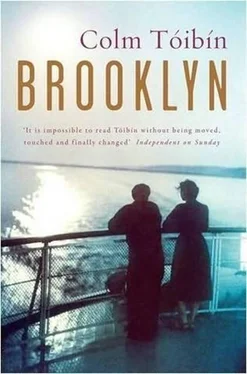A few of the other customers at the counter looked at her. She knew that she would not be able to hold back the tears. She did not wait for her order to arrive but ran out of the diner before anyone could say anything else to her.
During the day she felt that Miss Fortini was looking at her more than usual and this made her acutely conscious of how she appeared when she was not dealing directly with a customer. She tried to look towards the door and the front windows and the street, she tried to seem busy, but she found that she could, if she did not stop herself, move easily into a sort of trance, thinking over and over of the same things, about everything she had lost, and wondering how she would face going back to the evening meal with the others and the long night alone in a room that had nothing to do with her. Then she would find Miss Fortini staring at her across the shop floor and she would try once again to seem cheerful and helpful to customers as though it were a normal day at work.
The evening meal was not as difficult as she had imagined, as both Patty and Diana had bought new shoes and Mrs. Kehoe, before she could give them her full approval, needed to see what costume or dress and other accessories they would be worn with. The kitchen before and after supper became like a fashion parade, with both Miss McAdam and Miss Keegan withholding approval each time Patty or Diana came into the room wearing the shoes and some new set of clothes with a different handbag.
Mrs. Kehoe was not sure, once she had seen Diana's shoes with the costume they were intended to match, that they were dressy enough.
"They are neither fish nor fowl," she said. "You couldn't wear them to work and they mightn't look great on a night out somewhere. I can't see why you bought them unless there was a sale."
Diana looked crestfallen as she admitted that there had been no sale.
"Oh, then," Mrs. Kehoe said. "All I can say is that I hope you kept the receipt."
"Well, I quite like them," Miss McAdam said.
"So do I," Sheila Heffernan added.
"But when would you wear them?" Mrs. Kehoe asked.
"I just like them," Miss McAdam said and shrugged.
Eilis slipped away, glad no one had noticed that she had not spoken once at the meal. She wondered if she could go out now, do anything rather than face her tomb of a bedroom and all the thoughts that would come when she lay awake and all the dreams that would come when she slept. She stood in the hall, and then turned upstairs, realizing that she was afraid too of the outside, and even if she were not she would have no idea where to go at this time of the evening. She hated this house, she thought, its smells, its noises, its colours. She was already crying as she went up the stairs. She knew that as long as the others were discussing their wardrobes in the kitchen below, she would be able to cry as loudly as she pleased without their hearing her.
That night was the worst she had ever spent. It was only as the dawn came that she remembered something Jack had said to her on the day in Liverpool before she had caught the boat, a time that now seemed like years ago. He had said that he found being away hard at first, but he did not elaborate and she did not think of asking him what it really had been like. His manner was so mild and good-humoured, just as her father's had been, that he would not in any case want to complain. She considered writing to him now asking him if he too had felt like this, as though he had been shut away somewhere and was trapped in a place where there was nothing. It was like hell, she thought, because she could see no end to it, and to the feeling that came with it, but the torment was strange, it was all in her mind, it was like the arrival of night if you knew that you would never see anything in daylight again. She did not know what she was going to do. But she knew that Jack was too far away to be able to help her.
None of them could help her. She had lost all of them. They would not find out about this; she would not put it into a letter. And because of this she understood that they would never know her now. Maybe, she thought, they had never known her, any of them, because if they had, then they would have had to realize what this would be like for her.
She lay there as the light of day began; she did not think she would be able to manage another night like this. For a while she was quietly resigned to the prospect that nothing would change, but she did not know what the consequences would be, or what form they would take. Once more, she got up early and left the house without making a sound and walked the streets for an hour before going to have a cup of coffee. She noticed the cold in the air for the first time; it seemed to her that the weather had changed. But it hardly mattered now what the weather was like. She found a place in a diner where she could have her back to everybody, and no one could comment on the expression on her face.
By the time she drank the coffee and had a bun and managed to get the waitress's attention to pay the bill, she realized that she had left herself too short a time to get to work. If she did not hurry, she was going to be late for the first time. There were crowds in the streets and she could not easily get past people. She wondered at one point if people were not deliberately blocking her way. It took a long time for the traffic lights to change. Once she was on Fulton Street, it was even harder; it was as though crowds were coming out of a football game. Even moving at a normal pace was hard. She arrived at Bartocci's with just a minute to spare. She did not know how she was going to spend the day standing on the shop floor trying to look pleasant and attentive. The minute she appeared upstairs in her work clothes she caught Miss Fortini's gaze, which seemed disapproving as she began to move towards her, only for her then to be distracted by a customer. Once the customer had been dealt with, Eilis was careful not to look Miss Fortini's way again. She kept her back to her for as long as she could.
"You don't look well," Miss Fortini said when she approached.
Eilis could feel her eyes filling with tears.
"Why don't you go downstairs and have a glass of water and I'll be down in a second?" Miss Fortini said. Her voice sounded kind but she did not smile.
Eilis nodded. It struck her that she had not yet been paid; she was still living on the money Rose had given her. If they sacked her, she did not know if they would pay her. If they did not, within a short time she would have no money at all. It would be hard, she thought, to find another job, but even if she did she would have to be paid at the end of the first week, otherwise she would not be able to pay the rent to Mrs. Kehoe.
Downstairs, she went into the bathroom and washed her face. She stared at herself in the mirror for a moment and then stood tidying her hair. Then in the staff room she waited for Miss Fortini.
"Now you'll have to tell me what's wrong," she said as she came into the room and closed the door behind her. "Because I can see that there's something wrong and soon some of the customers will begin to notice and then we'll all be in trouble."
Eilis shook her head. "I don't know what's wrong."
"Is it your time of the month?" Miss Fortini asked.
Eilis shook her head again.
"Eilis"-she pronounced the name strangely, with too much emphasis on the second syllable-"why are you upset?" She stood in front of her and waited. "Would you like me to call Miss Bartocci?" she asked.
"No."
"Then what?"
"I don't know what it is."
"Are you sad?"
"Yes."
"All the time?"
"Yes."
"Do you wish you were with your family at home?"
"Yes."
"Do you have family here?"
"No."
"No one?"
"No one."
"When did the sadness begin? You were happy last week."
Читать дальше












